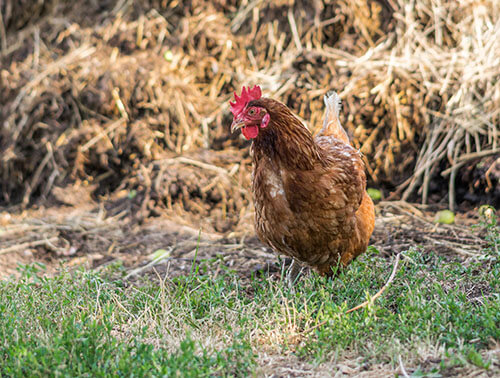Poultry biosecurity: Keeping your birds healthy
Sep 09, 2019

By Dr. Lew Strickland, Extension Veterinarian University of Tennessee
By now, I’m sure you have heard or read about avian influenza (AI). This is an infection of birds with avian influenza type A viruses that occur naturally among wild aquatic birds worldwide and can infect domestic poultry and other animal species. Wild aquatic birds can be infected with AI viruses in their intestines and respiratory tract but usually do not get sick. However, avian influenza type A viruses are very contagious among all birds and can infect and even kill certain domesticated species including chickens, ducks, and turkeys. Birds may get these viruses through direct contact with infected waterfowl or poultry or from contaminated surfaces. Strict biosecurity measures can go a long way in preventing diseases and outbreaks.
The best offense is a good defense, so here are a few recommended biosecurity guidelines:
Keep Your Distance:
Restrict access to your property and your birds. Consider fencing off the area where your birds are kept and make a barrier area if possible. Allow only people who care for your birds to come into contact with them. If visitors have birds of their own, do not let them near yours. Game birds and migratory waterfowl should not have contact with your flock because they are carriers of AI.
Keep It Clean:
Wear clean clothes, scrub shoes with disinfectant, and wash hands thoroughly before entering your bird area. Wear gloves once inside the area while cleaning cages and changing food and water daily. Clean and disinfect equipment that comes in contact with your birds or their droppings, including cages and tools. Remove manure before disinfecting and discard gloves once finished. Properly dispose of dead birds.
Don’t Haul Disease Home:
If you’ve been near other birds or bird owners, such as at a feed store, clean and disinfect vehicle tires, poultry cages, and equipment before going home. Have your birds been to a fair or exhibition? Keep them separated from the flock for at least two weeks afterwards. New birds should be kept separate from your flock for at least 30 days.
Don’t Borrow Disease:
Do not share lawn and garden equipment, tools, or poultry supplies with neighbors or other bird owners. If you do, clean and disinfect these items before they reach your property.
Know the Warning Signs:
Early detection is important to prevent spread of disease. These are some clinical signs of a flock infected with avian influenza:
• Sudden increase in deaths in your flock
• Sneezing, gasping for air, coughing, and nasal discharge
• Watery and green diarrhea
• Lack of energy; poor appetite
• Drop in egg production; thin-or soft-shelled, misshapen eggs
• Swelling around the eyes, neck, and head
• Purple discoloration of the wattles, combs, and legs
Keeping your poultry healthy is important. Contact your local Co-op or your local extension agent for more information on poultry biosecurity.
By now, I’m sure you have heard or read about avian influenza (AI). This is an infection of birds with avian influenza type A viruses that occur naturally among wild aquatic birds worldwide and can infect domestic poultry and other animal species. Wild aquatic birds can be infected with AI viruses in their intestines and respiratory tract but usually do not get sick. However, avian influenza type A viruses are very contagious among all birds and can infect and even kill certain domesticated species including chickens, ducks, and turkeys. Birds may get these viruses through direct contact with infected waterfowl or poultry or from contaminated surfaces. Strict biosecurity measures can go a long way in preventing diseases and outbreaks.
The best offense is a good defense, so here are a few recommended biosecurity guidelines:
Keep Your Distance:
Restrict access to your property and your birds. Consider fencing off the area where your birds are kept and make a barrier area if possible. Allow only people who care for your birds to come into contact with them. If visitors have birds of their own, do not let them near yours. Game birds and migratory waterfowl should not have contact with your flock because they are carriers of AI.
Keep It Clean:
Wear clean clothes, scrub shoes with disinfectant, and wash hands thoroughly before entering your bird area. Wear gloves once inside the area while cleaning cages and changing food and water daily. Clean and disinfect equipment that comes in contact with your birds or their droppings, including cages and tools. Remove manure before disinfecting and discard gloves once finished. Properly dispose of dead birds.
Don’t Haul Disease Home:
If you’ve been near other birds or bird owners, such as at a feed store, clean and disinfect vehicle tires, poultry cages, and equipment before going home. Have your birds been to a fair or exhibition? Keep them separated from the flock for at least two weeks afterwards. New birds should be kept separate from your flock for at least 30 days.
Don’t Borrow Disease:
Do not share lawn and garden equipment, tools, or poultry supplies with neighbors or other bird owners. If you do, clean and disinfect these items before they reach your property.
Know the Warning Signs:
Early detection is important to prevent spread of disease. These are some clinical signs of a flock infected with avian influenza:
• Sudden increase in deaths in your flock
• Sneezing, gasping for air, coughing, and nasal discharge
• Watery and green diarrhea
• Lack of energy; poor appetite
• Drop in egg production; thin-or soft-shelled, misshapen eggs
• Swelling around the eyes, neck, and head
• Purple discoloration of the wattles, combs, and legs
Keeping your poultry healthy is important. Contact your local Co-op or your local extension agent for more information on poultry biosecurity.